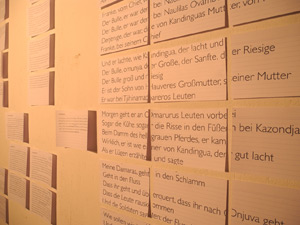Collaborative voice/text installation showcased in Stuttgart

Work in progress: Hoffmann, Sarreiter and Bellu's evolving voice/text installation in the lead up to the exhibition opening at the Württembergischer Kunstverein in Stuttgart
A voice/text installation collaboratively produced by APC research fellow Anette Hoffmann, Regina Sarreiter and Matei Bellu (Berlin) is being shown as part of the exhibition, Acts of Voicing: On the Poetics and Politics of the Voice, which opened at the Württembergischer Kunstverein in Stuttgart, Germany this month. The exhibition runs until January 2013.
Titled Unerhörter Bericht über die deutschen Verbrechen in den kolonisierten Gebieten und über das fortwährende Wirken der Gewalt bis in die Gegenwart (Unheard/outrageous report on the crimes of the Germans in the colonized regions and the ongoing effect of violence to the present day), the work is based on Hoffmann's earlier work on the 1931 voice recordings of Namibians by Hans Lichtenecker as part of his endeavor to create an 'archive of races'. For these recordings, people - who also were subjected to Lichtenecker's anthropometric practice of producing life-casts, photographs and measurements - spoke into the phonograph.
Their voices document two major moves vis-à-vis the practice of objectification. Firstly, many of the speakers appropriated a speaking position, which allowed them to present themselves as social persons, a move that clearly challenged the position as 'objects of racial examination', which was assigned to them in the anthropometric project and the overall racism of physical anthropology of the time. Secondly, the translations of the recordings also revealed moments of critique; for instance, in the performances of praise poetry that were recorded with the Otjiherero-speaker, Wilfred Tjiueza.
The installation makes these performances and speech-acts intelligible by deploying some of the recordings and decrypting the condensed poetics of praise poetry. Some of the recordings that are included in the installation speak of the colonial war in Namibia (1904-8), the effects of which are felt until the present day - the loss of land, for instance. Not claiming an exhaustive understanding of the layers within these performances, which were conserved as fragments or traces, Hoffmann/Sarreiter/Bellu seek to afford the listener a glimpse into discourses on colonial violence that survived - ironically - in the documentation of a racist project.
The exhibition, Acts of Voicing, foregrounds the aesthetic, performative and political significance of the human voice, centering on questions of agency and performativity.
'Acts of Voicing, which evinces specially designed exhibition architecture, not only exhibits works of more than 30 artists but is also conceived of as a stage for performances, workshops, lectures and screening programs,' say the curators. 'It embodies a series of process-related installations, which are expanded during the course of the exhibition and are thus perpetually shifting the overall scenario. In lieu of a static space, an ever-changing experiential space is engendered, through which the exhibition visitors advance along different planes, even physical ones. Both the exhibition choreography and the way it is displayed accommodate the performative character of the voice.'
The exhibition also focuses on the political implications of the voice, carving out the differences between phone as the meaningful, political voice of the citizen and the bare voice/noise that cannot be heard in the realm of the polis - a differentiation, which harks back to Aristotle, but also addresses Rancière's readings of occasions of (unexpectedly voiced) disagreement.
Hoffmann/Sarreiter/Bellu's installation, Unerhörter Bericht, elaborates on this differentiation as situated in colonial knowledge production, which refused the recordings and therewith the speakers (of 1931) the status of meaningful voices. This is revealed most poignantly by the fact that the recordings, like many others that were produced under similar circumstances, were not translated until 2007.
Hoffmann has been invited to speak at the Württembergischer Kunstverein about her work on praise poetry. Her paper, Verbal Riposte: Kritik, Mehrstimmigkeit und performative Darstellungen von Geschichte in Aufnahmen von praise poetry (Verbal riposte: Critique, polyphony and performative representations of history in the recordings of praise poetry), will be presented on 5 December in Stuttgart.
For more information about this exhibition, see: http://www.wkv-stuttgart.de/en/program/2012/exhibitions/acts-of-voicing/.